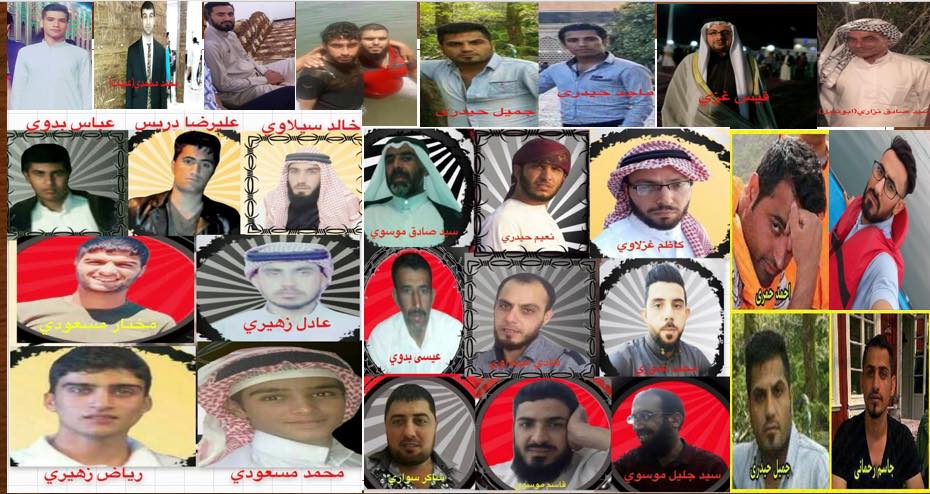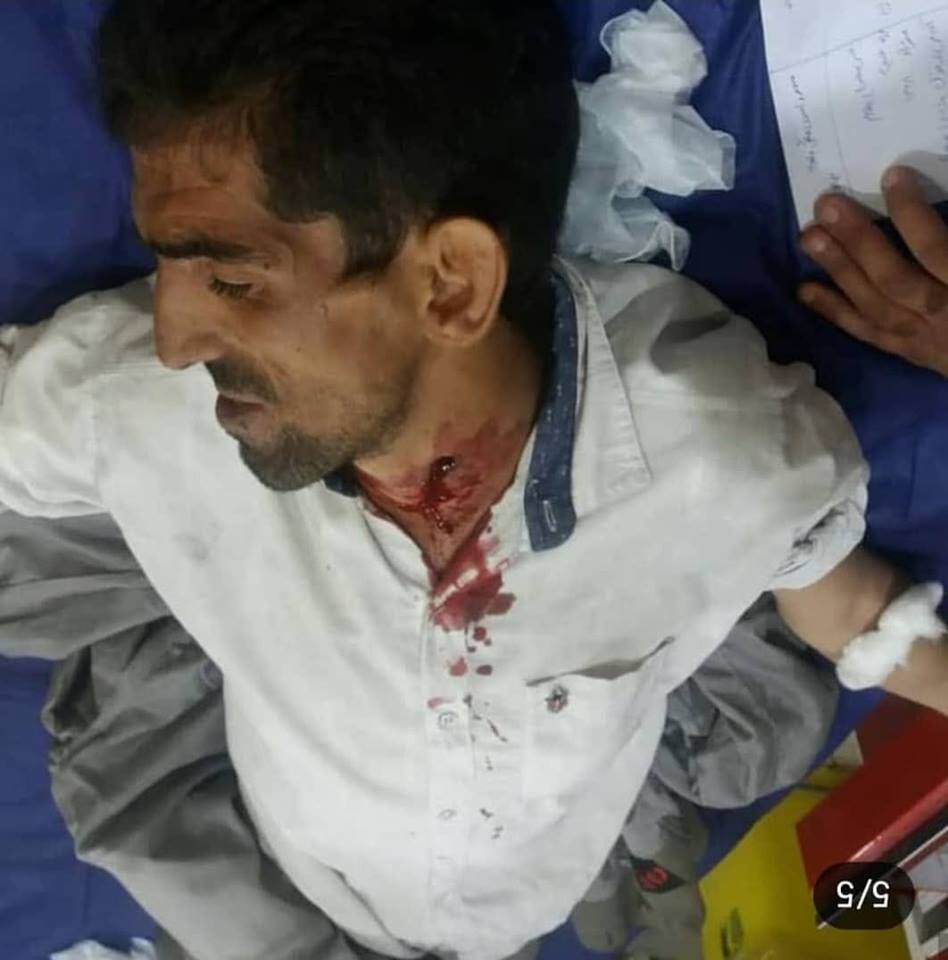
Iran is witnessing a massive surge in human rights abuses of all types. These include extrajudicial killings, arrests, torture; crackdowns on journalists, intellectuals, activists and human rights advocates, repression of student movements, and persecution of ethnic and religious minorities. Amongst those arrested are female activists and elderly people, including individuals with no involvement in any sort of activism, who apparently merely had the misfortune to be in the area where arrests of activists were taking place.
The government appears to be using an attack on an IRGC military parade in Ahwaz on September 22 as a pretext for justifying intensified brutality and repression of political dissidents, journalists, intellectuals, human rights activists and minorities, arresting almost 1,000 Ahwazis in the weeks since the attack in which dozens of regime troops or cadets were killed or wounded. According to the latest reports, at least 600 of the Ahwazi activists arrested are still being detained. The arrests have been particularly heavy around the towns of Muhammarah, Abadan and Khafajieh.
Those detained have been taken to unknown destinations, with their families denied any contact or even information on their whereabouts.
Ahwazi diaspora activists have launch tweet storm on Wednesday, October 24 in support of Ahwazi political prisoners calling on the world and the international community to join the movement with the hashtag #Free600AhwaziDetainees. Also, the tweeter storm asked cancelling the heavy sentences against Ahwazi prisoners by writing shortly in Arabic, Persian, English or your own language. The Campaign has urged the Iranian authorities to promptly reverse unjust sentences against the prisoners and release them immediately and unconditionally.
Raids, arrests of women, elderly people
Ahwazi rights groups revealed that Iranian security forces have raided activists’ homes in the regional capital city of Ahwaz, as well as in Hamidieh, Khafajieh, and rural areas, arresting activists and political dissidents, including women and elderly people.
One of the detained activists, 70-year-old Sadiq Al-Nazari is suffering from a number of chronic medical conditions, according to Ahwazi human rights activists, with his family extremely concerned for his wellbeing.
Karim Dahimi, a human rights activist, based in London, said that the Iranian government has been systematically detaining Ahwazi activists taking them to secluded torture facilities known as ‘black sites’, which are infamous amongst the public, although the regime refuses to acknowledge their existence, being used to perpetrate horrific torture. Dahimi explained that the latest campaign of arrests and detentions in the black site prisons aims to provoke panic amongst dissidents and activists and to terrorize them into silence, ending any protest against the regime’s multifaceted oppression.
Citing hundreds of reports documenting the mass detentions, prison sentences on fabricated charges and executions of Ahwazi freedom activists, Dahimi condemned the regime’s actions, saying that this behavior is illegal, as well as morally repulsive, by every measure. He added, “These procedures defy all international norms and laws under which the rights of peoples are protected, including the freedom and security of individuals.”
Mass arrests
The pattern of mass arrests in the region of Ahwaz, which has witnessed numerous peaceful protests, has been repeated in other areas across Iran as the regime tries to clamp down on growing anger at the brutality and endemic corruption.
Protesters at massive peaceful demonstrations by Ahwazis have called for an end to the regime’s anti-Arab racism and repression, as well as demanding resolution of the problems plaguing the region, including high prices, unemployment, severe pollution, lack of drinking water and worsening sandstorms, as well as condemning the regime’s massive and controversial dam-building and river-diversion program in Ahwaz, under which the region’s once abundant rivers have been reduced to a trickle or dried up completely as the waters are rerouted to other, ethnically Persian regions, which is the cause of the water shortages and dust storms.
The latest arrests are also widely viewed as part of a campaign by the regime to militarize the region, with the leadership in Tehran seen as exploiting the attack on the IRGC forces to justify a plan to intensify the already severe repression of the indigenous Arab population. It’s feared that this may lead to a new crackdown targeting all activists and dissidents in order to silence dissent and quell any protests against the regime’s racist policies and behavior.
Speaking on a condition of anonymity, an Ahwazi human rights activist said, “The Iranian government practices relentless clampdown as represented by mass arrests and political executions. It changes the essence of internal conflicts through attempting to link every domestic movement to foreign conspiracies so that it can justify oppression and avoid engagement with the rising masses demanding their rights. The people want the regime to stop spending their money on regional wars and its own expansionist ambitions. They want to see the nation developed and be given their rights to freedom and a decent life.”
Following the latest arbitrary arrests and wave of repression, Ahwazi human rights organisations have called for the immediate and unconditional release of all detainees, warning that they will be tortured to obtain confessions.
Whilst the Iranian regime is nominally a signatory to numerous human rights treaties, its systematic racism towards Ahwazis and other ethnic minorities who collectively make up more than half of Iran’s population shows the hollowness of the regime’s commitment to these agreements.
Torture as standard
The regime also ignores its own legislation on human rights; although the Iranian constitution bans torture in detention centers, it is the standard tool of the regime’s intelligence services, IRGC and prison staff, used to extract confessions and to terrorize inmates and the general public into silence.
During interrogation, Ahwazi prisoners are forced to write detailed accounts of their daily lives from childhood up to their time in captivity. They are compelled to write everything they know, even if it has no link to political and security issues. These methods, along with the physical torture, are used to wear down the captives both mentally and physiologically and to destroy their spirits and place excessive pressure on him.
The intelligence service also uses long, open discussions with the Ahwazi prisoner as a technique to gain more information and to identify prisoner’s orientations and directions, as well as to uncover details that may have been missed in their written accounts. The content of these discussions is then manipulated and used to fit the regime’s objectives. Often, the detainee will be labelled as dangerous on the basis of unrelated and wholly innocent comments, fabricated accusations and ill-defined charges such as ‘waging war against God’, ‘spreading corruption on Earth’, ‘posing a potential threat to national security’ or ‘spreading propaganda against the regime’ in an attempt to further malign Ahwazi peoples as innately criminal.
The efforts of all these regime activities,in addition to breaking the prisoners’ will and issuing false charges against Ahwazi prisoners after filming and documenting prisoners’ coerced confessions, is to orchestrate a scenario in which the prisoners have incriminated themselves and voluntarily offered their self-incriminating confessions; despite the fact that everyone is well aware that the whole process is a Kafkaesque farce, these engineered “confessions”, according to the regime’s perverted logic, provide a justification for their imprisonment or execution.
The regime’s atrocities, up to and including killing by torture, against dissidents and detainees are routine and unpunished; perpetrators are not only let off with their crimes but are routinely promoted within the regime hierarchy. Meanwhile, the families of victims who died under torture are denied access to legal action over the crimes perpetrated against their loved ones, despite torture being proscribed and considered a grave offence by the regime’s supposedly Islamic penal code.
It is clear that the international community is tacitly giving Iran’s regime carte blanche to continue its human rights violations by its refusal to condemn this continuous and worsening brutality and systematic disregard for international law.
The Iranian government is trying to annihilate Ahwazi Arab existence and presence in the country once and for all. As such, Ahwazi activists emphasize that international silence about the regime’s violations means international approval. They are calling for the international community to intervene unconditionally to stop the Iranian regime’s campaign of multifaceted persecution; the relentless executions, torture, and denial of fundamental human and civil rights; the destruction of the environment; and the obliterating of the culture, identity and existence of an entire people.
Rahim Hamid is an Ahwazi Arab freelance journalist and human rights advocate who mainly writes about the plight of his people in Iran.
















































